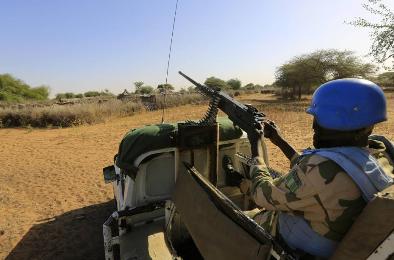Security situation in Darfur deteriorated in 2013: UNAMID
January 23, 2014 (KHARTOUM) – The African Union and United Nations Joint Special Representative and Joint Chief Mediator for Darfur, Mohamed Ibn Chambas, announced that negotiations are underway with the Sudanese government to deploy international and African observers to monitor the Darfur crimes special tribunal.

“We currently seek to arrive at a memorandum of understanding to implement the DDPD with regard to the crimes committed in Darfur”, he added
He noted that the role of the observers is to monitor the performance of the Sudanese special courts of Darfur crimes and verify their compliance with international standards.
He said they are determined to communicate with all non-signatory armed groups to convince them to sit at the negotiating table, pointing to ongoing contacts with the leader of Sudan Liberation Movement/AW (SLM-AW) leader Abdel-Wahid Mohamed al-Nur.
The UN official observed that criminal and banditry acts in Darfur have recently increased; acknowledging the African Union/United Nations Mission in Darfur (UNAMID) is facing inherent difficulties in carrying out its mandate and predicted that those difficulties would further exacerbate.
He said that 2013 was the worst year in UNAMID’s history, noting that 16 peacekeepers were killed in attacks he described as war crimes and clear violation of the international humanitarian law.
He asserted that UNAMID will not hesitate in carrying out its mandate to protect itself when attacked, saying they will cooperate with the government to supply them with evidences in order to bring perpetrators who attack peacekeepers to justice.
Ibn Chambas also said tribal conflicts have jumped in 2013 besides continuation of armed clashes between government troops and rebel groups amid looting incidents carried out by armed groups and bandits.
This was coupled with a deterioration in the security situation in Darfur leading to increasing numbers of the Internally Displaced Persons (IDPs) and pointed to displacement of 3400 people recently
The UN official also said they would continue to monitor any imminent threat coming from CAR saying UNAMID was prepared for any spillover from the conflict in Central African Republic (CAR) into Darfur.
He further mentioned that reducing UNAMID size wouldn’t impact its performance and emphasized that UNAMID did not take sides in the conflict.
He said that difficult conditions and setbacks have not prevented UNAMID from carrying out its mandate and pointed that a development strategy supported by the Sudanese and Qatari governments including 1071 projects was launched; noting that 300 projects are currently being implemented.
Ibn Chambas also pointed that in 2013 he asked several regional partners to participate in the peace process and conducted meetings with the non signatory groups in Arocha, Tanzania and Addis Ababa, stressing that Sudan’s government was aware of those meetings.
He praised the armed Justice and Equality Movement/Bashar (JEM-Bashar) for joining the DDPD and its commitment for supporting peace despite assassination of its entire leadership, saying that Darfur Regional Authority (DRA) was established and functioning well.
He pointed that 2013 witnessed convening of the international donors meeting in Doha in which sizable pledges for development in Darfur were made under the umbrella of Darfur development strategy.
The joint special representative sent a message for all conflicting parties in Darfur saying that it has been proven after ten years of conflict that violence is not the solution, adding that solution lies in dialogue and negotiations.
He saw that actual needs of the people of Darfur would only be met setting development agenda that improves social and economic conditions and encourages return of refugees and IDPs who have been living for a decade on camps in Darfur and the neighboring countries.
Darfur has been a flashpoint for lawlessness and violence since rebel movements took up arms against the Khartoum government in 2003.
The United Nations estimates as many as 300,000 people have been killed and almost 3 million people have been displaced during the ongoing conflict in the region, however, the Sudanese government put the number of dead at only 10,000.
(ST)
